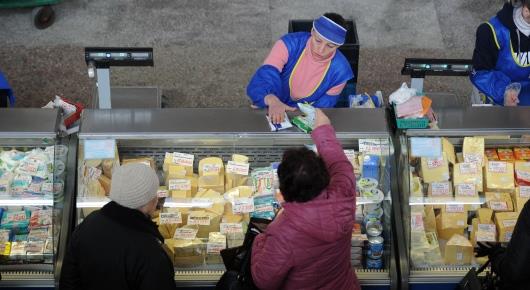Belarus reviews food safety system to meet modern requirements

As one short-term FAO intervention on food safety ends in Belarus, another will soon begin. This is what governmental representatives agreed upon this week in Minsk during five days of talks to conclude the previous project and set priorities for future work.
FAO has been working in Belarus to understand the country’s food safety structures and needs for modernization.
Agriculture and food production are important sectors in Belarus. One of the crucial qualities being pursued is that food should be safe for human consumption – no matter whether products are local or foreign or bound for domestic or export markets.
The critical basis for that safety is a comprehensive food control system that meets modern requirements. In recent months, FAO experts and international and national specialists have reviewed the current structures and modalities for food safety in Belarus.
“Based on the findings and the feedback from national authorities, we now have a set of focus areas on which we will work together to improve,” said Mary Kenny, FAO food safety and consumer protection officer.
The Ministry of Agriculture and Food and the Ministry of Health are the main players in Belarus, together with other governmental bodies such as the State Veterinary Service. Smooth collaboration among these actors is a prerequisite for a robust, efficient food safety control system, and this week’s workshop provided an excellent starting point for future work.
The Russian Federation is an important export market for Belarusian food products, and the Government of Belarus is committed to support export diversification and target other markets, too. Certain products (dairy products, honey, fish, and gelatin) are allowed to enter the European market, but meat exports are not permitted. Expanding market access opportunities will require that foreign market requirements are met. Another priority is the accession process to the World Trade Organization (WTO), which requires negotiations on sanitary and phytosanitary issues and requirements.
In this context, the Government intends to strengthen its abilities in the areas of food safety risk assessment, science-based standard setting, import and export inspection, and certification. Belarus has requested FAO’s technical support to help strengthen official laboratories’ capacities in using up-to-date methods of detection and analysis in line with international standards.
Belarus is not alone in these endeavors, Kenny said.
“Numerous countries in Europe and Central Asia aim to improve agrifood trade, and food products have to be safe to achieve this goal,” she said.
High-level representatives of Belarusian line ministries and veterinary and scientific institutions – all well aware of the importance of strengthening the national food control system – participated in this week’s discussions with an open and future-looking manner. Based on FAO’s assessments, they agreed to work on a set of priorities for the new FAO project, to be launched later this year.
3 August 2018, Minsk, Belarus
